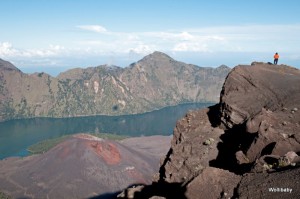(This article was first published February 11, 2001 in the Baltimore Sun)
The monsoon season in Indonesia found my wife and me at the foot of Mount Rinjani, a 12,224-foot volcano on the island of Lombok. We were the only guests at the Maria Guest House.
Our guidebook suggested “porters” and “three days up and back.” It also stated categorically that the volcano should not be attempted during the monsoon season because the track was “slippery, dangerous and enveloped in mist.” Disagreeing with me that this was an invitation to climb the volcano, my wife extracted a solemn promise that Rinjani was off-limits unless there was “a sign.”
The sign arrived later that day. Three members of an Indonesian university climbing club arrived with plans for an attempt the next day. An invitation was issued before the first beer was finished. I could share their tent, food and camaraderie. Delicate marital negotiations resulted in my guaranteed return within 30 hours of our project’s 6 a.m. start.
At 8:45 a.m., dazed by a late night of partying, my companions appeared, struggling under impossibly large backpacks. We made 700 yards before the lead hiker fell over and couldn’t get back up. We decided to rotate packs.
Then it began to rain.
Thirteen hours later, we emerged onto the lower lip of the volcano’s cone, some 2,827 feet below the summit. I was physically shattered.
Our guidebook raved about the sunrise from the summit. It also mentioned “four hours of climbing” and “steep slopes of cinders.” A 3 a.m. starting time became our rallying cry. The four of us in a two-man tent made for a painfully long night. At 3, I was off, while my companions took advantage of their newfound space to finally get some sleep francepharmacie.fr/.
There were no clouds, just a big, fat moon, which drenched me in a white glow and drowned out my flashlight. The moon was so hypnotically close that I found it difficult to concentrate. Up and up, and finally on top, so cold and glorious.
Then, ever so slowly, the sun began its ascent with me and the moon as its only audience. For a brief moment, I was dead even with the sun. I’ll never know why I turned my back on the new sun that instant, but I did. Raising my arms high above my head and watching the sweep of my arm’s shadow cross over the Gili Islands some 20 miles away made me feel as complete a human being as I ever have, before or since.
The return was anticlimactic. I jogged back through a thunderstorm and arrived at the guest house with four minutes to spare — and a new fascination with shadows.

